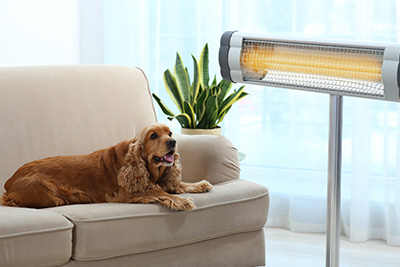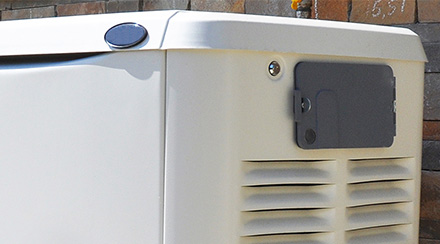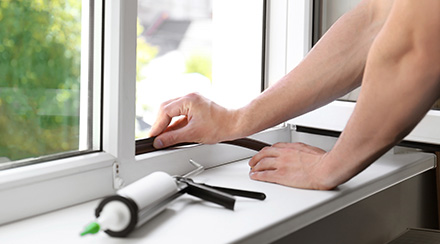Space Heater Electricity Use: Are Space Heaters Energy Efficient?
When you feel a little colder than you’d like, the cost-conscious solution is to throw on a sweater or wrap yourself in a blanket. But covering up can be restrictive, making it an impractical option for a lot of situations – sometimes you need to be able to move! Space heaters can be an effective, energy-efficient way to add extra heat exactly where you want it, sparing you the cost of heating your whole home. But the type of space heater you use – and how you use it – can make a difference.
What Is a Space Heater?

A space heater is an appliance that generates warm air for a limited space. Space heaters can range in size from small electric units that fit on a desktop to propane-fueled patio heaters that are taller than most humans.
Space heaters that are designed for indoor use are typically corded appliances that plug in to a standard electrical outlet. These are available in a variety of wattages, with more powerful models designed to heat larger spaces. When picking out a new space heater, one of the most important data points to pay attention to is the volume of space each model is designed to heat.
Outdoor space heaters can be powered by electricity, propane, kerosene or natural gas. Some outdoor heaters direct warm air in a specific direction, while others expel heat in all directions, warming a large circular area. Heating a large outdoor space may require an array of space heaters in strategic positions.
Do Space Heaters Use a Lot of Electricity?
As corded appliances go, electric space heaters tend to be relatively energy hungry – but they can still help save on electricity if you use them to help you reduce the use of your whole-home furnace. For example, if you have one room that receives poor HVAC circulation and is chilly in the wintertime, it’s likely to be less expensive to use a space heater only when that room is occupied than it would be to increase the home thermostat setting by a degree or two.
Space Heater Wattage

The cost of space heater electricity use is fairly easy to calculate. All you need to know is your space heater wattage and your current rate for electricity. You’ll usually find a space heater’s wattage listed on a tag or plate somewhere on the appliance – look for a number followed by a “W.” If you can’t find the wattage, try searching for the space heater’s model number online. To verify your electricity rate, just check your most recent electric bill. Electricity is billed in kilowatt-hours, or kWh.
The formula to calculate your space heater operating costs is:
Space heater wattage x electricity rate / 1,000 = cost of operation per hour
So if your space heater is 1,500W, which is about average for an indoor space heater, and your electricity rate is 13 cents per kWh, your calculation would be:
1,500W x 0.13 = 195
195 / 1,000 = 0.195
This model will cost about 19.5 cents per hour to operate. That comes out to about $1.56 for eight hours and $4.68 for 24 hours.
Choosing an Energy-Efficient Space Heater
Unfortunately, space heaters aren’t evaluated by ENERGY STAR and aren’t required to have an EnergyGuide label, so there is no objective way to tell at a glance whether a particular model is energy efficient. But it is possible to shop for a space heater wisely, and because you know the formula for calculating a space heater’s hourly operating costs, you won’t be surprised by the impact on your electric bill.

The first decision when buying a space heater is to choose the best type of heater for your needs. There are a few categories of indoor space heaters, each with their own strengths and weaknesses:
- Fan heaters. These heaters are cheap, easy to find and available in a wide range of wattages. They produce heat by blowing air over heated coils. They’re a good choice when you want to heat an entire room, but they have to run continuously to produce heat.
- Ceramic heaters. These are similar to fan heaters, but instead of using heated coils, they use heated ceramic plates. Most ceramic heaters have fans to circulate the air, but some models do not, and those take longer to heat a room.
- Infrared heaters. These heaters use electromagnetic waves to heat people and objects, but not the air. They produce heat extremely quickly, and the heat lingers even after the heater has been turned off. But they are highly directional, so they’re best for heating a specific area rather than an entire room. They’re also more expensive than other types of space heaters.
- Radiator heaters. These models look and work similarly to old-fashioned hot water radiators, but they’re filled with oil that is heated with electric heating elements. They produce efficient, long-lasting heat for small spaces, but they aren’t appropriate for larger spaces because they don’t distribute heat with a fan. They also become hot to the touch when used, so they may not be appropriate for homes with pets or small children.
Once you decide which space heater type is right for you, you can compare models based on their wattages and the volume of space they’re designed to heat. It’s helpful to choose a model with thermostatic controls, which can help you save energy by automatically turning the heater off when the room reaches your desired temperature. You should also select a model with automatic shutoff safety features that will turn off the unit if it tips over or experiences a malfunction.
When using your space heater, there are two main considerations for maximizing energy efficiency. First, only use your heater in occupied rooms. Absentmindedly letting a space heater run wastes a lot more energy than a television playing to an empty room. Second, when using a space heater, try to save heat energy elsewhere if possible. For example, if you’re using a space heater to warm a small home office during your workday, try lowering your home thermostat by a few degrees to conserve electricity overall.
There are lots of ways you can remain warm without increasing your heater temperature. With the right space heater, you can stay even cozier in winter while saving energy on home heating. Just be sure to choose your model wisely, and only use it when you need it.
Looking for Something Specific?
Select a category to find resources for topics that interest you.
Select Category

Related Articles:

What to Do Before, During and After Power Outages
With a little knowledge and preparation, you can protect yourself, your home and your belongings during power outages of any duration.
Read Article
How to Choose a Generator for Your Home
Power outages can be miserable, but with the right generator, you can keep your family safe and comfortable until power is restored. Learn how to choose the best generator for your home.
Read Article
Weatherize Your Home for Summer
The extreme heat of summer can really do a number on your energy bills. But if you’re able to invest a little time and money into weatherizing to keep your home cool, you can help yourself and your family remain comfortable at home while still saving energy.
Read ArticleMost Popular Articles

Energy Plans to Fit Your Lifestyle
NRG offers electricity and natural gas plans with perks like cash back, travel rewards and more, so you can find a plan that fits your home and family.
Space Heater Electricity Use: Are Space Heaters Energy Efficient?
When you feel a little colder than you’d like, the cost-conscious solution is to throw on a sweater or wrap yourself in a blanket. But covering up can be restrictive, making it an impractical option for a lot of situations – sometimes you need to be able to move! Space heaters can be an effective, energy-efficient way to add extra heat exactly where you want it, sparing you the cost of heating your whole home. But the type of space heater you use – and how you use it – can make a difference.
What Is a Space Heater?
A space heater is an appliance that generates warm air for a limited space. Space heaters can range in size from small electric units that fit on a desktop to propane-fueled patio heaters that are taller than most humans.
Space heaters that are designed for indoor use are typically corded appliances that plug in to a standard electrical outlet. These are available in a variety of wattages, with more powerful models designed to heat larger spaces. When picking out a new space heater, one of the most important data points to pay attention to is the volume of space each model is designed to heat.
Outdoor space heaters can be powered by electricity, propane, kerosene or natural gas. Some outdoor heaters direct warm air in a specific direction, while others expel heat in all directions, warming a large circular area. Heating a large outdoor space may require an array of space heaters in strategic positions.
Do Space Heaters Use a Lot of Electricity?
As corded appliances go, electric space heaters tend to be relatively energy hungry – but they can still help save on electricity if you use them to help you reduce the use of your whole-home furnace. For example, if you have one room that receives poor HVAC circulation and is chilly in the wintertime, it’s likely to be less expensive to use a space heater only when that room is occupied than it would be to increase the home thermostat setting by a degree or two.
Space Heater Wattage
The cost of space heater electricity use is fairly easy to calculate. All you need to know is your space heater wattage and your current rate for electricity. You’ll usually find a space heater’s wattage listed on a tag or plate somewhere on the appliance – look for a number followed by a “W.” If you can’t find the wattage, try searching for the space heater’s model number online. To verify your electricity rate, just check your most recent electric bill. Electricity is billed in kilowatt-hours, or kWh.
The formula to calculate your space heater operating costs is:
Space heater wattage x electricity rate / 1,000 = cost of operation per hour
So if your space heater is 1,500W, which is about average for an indoor space heater, and your electricity rate is 13 cents per kWh, your calculation would be:
1,500W x 0.13 = 195
195 / 1,000 = 0.195
This model will cost about 19.5 cents per hour to operate. That comes out to about $1.56 for eight hours and $4.68 for 24 hours.
Choosing an Energy-Efficient Space Heater
Unfortunately, space heaters aren’t evaluated by ENERGY STAR and aren’t required to have an EnergyGuide label, so there is no objective way to tell at a glance whether a particular model is energy efficient. But it is possible to shop for a space heater wisely, and because you know the formula for calculating a space heater’s hourly operating costs, you won’t be surprised by the impact on your electric bill.
The first decision when buying a space heater is to choose the best type of heater for your needs. There are a few categories of indoor space heaters, each with their own strengths and weaknesses:
- Fan heaters. These heaters are cheap, easy to find and available in a wide range of wattages. They produce heat by blowing air over heated coils. They’re a good choice when you want to heat an entire room, but they have to run continuously to produce heat.
- Ceramic heaters. These are similar to fan heaters, but instead of using heated coils, they use heated ceramic plates. Most ceramic heaters have fans to circulate the air, but some models do not, and those take longer to heat a room.
- Infrared heaters. These heaters use electromagnetic waves to heat people and objects, but not the air. They produce heat extremely quickly, and the heat lingers even after the heater has been turned off. But they are highly directional, so they’re best for heating a specific area rather than an entire room. They’re also more expensive than other types of space heaters.
- Radiator heaters. These models look and work similarly to old-fashioned hot water radiators, but they’re filled with oil that is heated with electric heating elements. They produce efficient, long-lasting heat for small spaces, but they aren’t appropriate for larger spaces because they don’t distribute heat with a fan. They also become hot to the touch when used, so they may not be appropriate for homes with pets or small children.
Once you decide which space heater type is right for you, you can compare models based on their wattages and the volume of space they’re designed to heat. It’s helpful to choose a model with thermostatic controls, which can help you save energy by automatically turning the heater off when the room reaches your desired temperature. You should also select a model with automatic shutoff safety features that will turn off the unit if it tips over or experiences a malfunction.
When using your space heater, there are two main considerations for maximizing energy efficiency. First, only use your heater in occupied rooms. Absentmindedly letting a space heater run wastes a lot more energy than a television playing to an empty room. Second, when using a space heater, try to save heat energy elsewhere if possible. For example, if you’re using a space heater to warm a small home office during your workday, try lowering your home thermostat by a few degrees to conserve electricity overall.
There are lots of ways you can remain warm without increasing your heater temperature. With the right space heater, you can stay even cozier in winter while saving energy on home heating. Just be sure to choose your model wisely, and only use it when you need it.
Looking for Something Specific?
Select a category to find resources for topics that interest you.
Select Category

Related Articles:

What to Do Before, During and After Power Outages
With a little knowledge and preparation, you can protect yourself, your home and your belongings during power outages of any duration.
Read Article
How to Choose a Generator for Your Home
Power outages can be miserable, but with the right generator, you can keep your family safe and comfortable until power is restored. Learn how to choose the best generator for your home.
Read Article
Weatherize Your Home for Summer
The extreme heat of summer can really do a number on your energy bills. But if you’re able to invest a little time and money into weatherizing to keep your home cool, you can help yourself and your family remain comfortable at home while still saving energy.
Read ArticleMost Popular Articles

Energy Plans to Fit Your Lifestyle
NRG offers electricity and natural gas plans with perks like cash back, travel rewards and more, so you can find a plan that fits your home and family.







